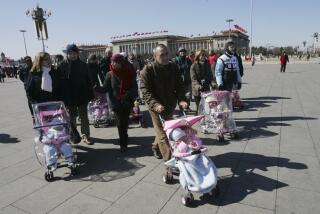China Redefines Extra Offspring as Burden Rather Than Offense
- Share via
SHANGHAI — China is revising its notorious one-child policy to remove the stigma it had attached to people who desire a larger family.
Instead of fines, families with unauthorized births will pay a “social compensation fee” to reflect the collective cost rather than the individual fault of bearing additional children.
The change might seem semantic, but experts say it marks a significant step toward a kinder and gentler family-planning policy--and an acknowledgment of transformations in Chinese society.
“The name change could ease tensions between officials and parents who want more children,” said Shen Anan, a demographer at the Shanghai Academy of Social Sciences. “It could also slow down the pace of population control and improve China’s image in the world.”
The one-child policy, which was begun in the early 1980s, has been widely criticized as a draconian exercise in social engineering. Much of the West has heard horror stories of infanticide and forced sterilization in the world’s most populous country.
In practice, however, the policy--which Chinese officials view as a weapon of last resort against a population time bomb--has always been unevenly implemented.
Even official figures show that as many as 80% of Chinese children under 14 have siblings.
The new law, which goes into effect next month, is more evidence that the unpopular approach might be nearing an end.
“The one-child policy was a reaction to the extreme population pressures of the time,” said Shen. “In another 15 years or so, the birth control policy as we know it will no longer exist.”
For ordinary people, the change also represents a move toward the rule of law. Despite its prominence in daily life, the one-child policy actually is being legislated for the first time. In the past, people obeyed it simply because the government told them to.
“It’s a sea change in how people see things,” said Siri Tellier, the Beijing-based China representative for the United Nations Population Fund. “They now know they have rights.”
Two decades of breakneck economic changes and a blossoming of personal freedoms have made the Chinese people much harder to control.
Gone are the days of a cradle-to-grave welfare system in which the state could tell its citizens where to work, who to marry and when to procreate. Now that people must fend for themselves in a competitive market economy, much of that leverage is gone.
Increased wealth and better education have even resulted in a negative population growth in some parts of the country. Large cities such as Shanghai now worry about a huge population of elderly who have fewer children to care for them.
That doesn’t mean Beijing can afford to give up the fight against overpopulation. Though the government says it met the goal of containing growth to a population of 1.3 billion at the beginning of this century, the true population figure remains elusive. Millions of migrant workers crisscross the land and produce unauthorized children who don’t get counted in the census.
The existing policy significantly altered birthrates in the cities but barely made a dent in the countryside, where the vast majority of Chinese live.
Although penalties ranging from stiff fines to confiscation of land to forced abortions were rampant in the 1980s and early ‘90s, it has become much easier in recent years to parent extra children through loopholes and lax enforcement.
Rural families and ethnic minorities can legitimately have more than one child, especially if the first child is a girl. Some have many more than two in the traditional quest for a male heir, either by paying fines or becoming migrants.
City dwellers also can have a second child if both parents were only children.
Others, sporting newfound wealth, gladly pay the fines. Some local officials have encouraged unplanned births to collect more fees.
Under the new law, local officials will no longer be able to pocket those fees and must turn the money over to the central government.
This is believed to be a tremendous disincentive for overzealous cadres.
“We are very happy with the policy that limits the power of family-planning workers,” said Tellier, of the U.N. Population Fund, whose agency helps the Chinese experiment with alternatives to rigid birth quotas.
But forced abortions and sterilization haven’t gone away. That’s why the Bush administration recently pulled U.S. funding for the agency for working with Chinese family-planning officials.
Others, however, credit the agency with helping the Chinese embrace a more voluntary form of birth control, which optimists believe is the shape of things to come.
“If they realized that population growth will not increase in a scary manner even with programs that respect individual rights,” said Tellier, “then they will surely accept it.”
More to Read
Sign up for Essential California
The most important California stories and recommendations in your inbox every morning.
You may occasionally receive promotional content from the Los Angeles Times.










